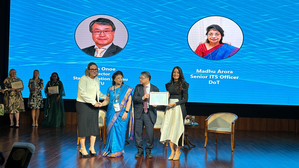New Delhi: The International Telecommunication Union’s (ITU) ‘World Telecommunication Standardization Assembly (WTSA) 2024’ in India saw highest-ever women participation in its history, marking a significant step toward gender-balanced delegations and leadership roles, it was announced on Friday.
According to Doreen Bogdan-Martin, Secretary General of the ITU, the industry must increase the number of women in leadership roles, especially in the standards study groups.
“It’s crucial for women to step up, take the floor, and make their voices heard. This is what the ‘Network of Women’ stands for — creating an environment where women feel empowered and supported. Mentorship plays a vital role in this transformation. It’s through mentoring, creating opportunities, and sharing our knowledge that we can truly progress,” she said during the event by The Network of Women in Standards (NoW).
The event underscored the commitment to advancing women’s leadership roles in STEM and standardisation.
The Indian government is implementing various measures to create an inclusive technology sector and empower women through technology platforms, in line with the vision of the Prime Minister Narendra Modi, who advocates for women-led development.
The country is making progress in this area, with an increasing number of women co-founders in startups and over 40 per cent of participants in STEM education being women. Initiatives such as Namo Drone Didi, Bank Sakhi, and Mahila E-Haat are empowering women to take on leadership roles in technology.
Dr Rim Belhassine-Cherif, Chair of NoW, highlighted the progress made in achieving gender balance at the event.
“One of the key objectives of ITU-WTSA 2024 was to promote gender-balanced delegations and increase the number of women in leadership roles, particularly as heads of delegations,” Belhassine-Cherif mentioned.
The increasing involvement of women in ICT standardisation is crucial as disruptive technologies such as artificial intelligence (AI) emerge. Women’s contributions can help ensure the development of inclusive, equitable, and sustainable standards that will drive technological progress for the benefit of all humanity, said experts.
–IANS


Comments are closed.